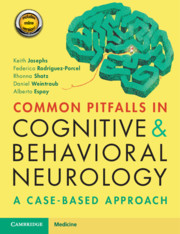Book contents
- Common Pitfalls in Cognitive and Behavioral Neurology
- Common Pitfalls in Cognitive and Behavioral Neurology
- Copyright page
- Dedication
- Contents
- Diseases Discussed in the Book
- Preface
- Acknowledgements
- Abbreviations
- Part 1 Missing the Diagnosis Altogether
- Part 2 Misidentifying the Impaired Cognitive Domain
- Part 3 Missing Important Clues in the History
- Part 4 Failure of Pattern Recognition
- Part 5 Difficult-to-Characterize Cognitive/Behavioral Disorders
- Part 6 Clinical Findings That Are Subtle
- Part 7 Misinterpreting Test Results
- Part 8 Attributing Findings to a Known or Suspected Disorder
- Part 9 Missing Radiographic Clues
- Case 41 Another Case of Vascular Cognitive Impairment?
- Case 42 Pseudoatrophic Pattern in Hydrocephalus
- Case 43 Parkinsonism, Ataxia, and Cognitive Impairment after Radiation Therapy
- Case 44 It’s Not Alzheimer Disease; Now What?
- Case 45 Getting the Full Picture
- Part 10 Management Misadventures
- Index
- Plate Section (PDF Only)
- References
Case 45 - Getting the Full Picture
from Part 9 - Missing Radiographic Clues
Published online by Cambridge University Press: 03 November 2020
- Common Pitfalls in Cognitive and Behavioral Neurology
- Common Pitfalls in Cognitive and Behavioral Neurology
- Copyright page
- Dedication
- Contents
- Diseases Discussed in the Book
- Preface
- Acknowledgements
- Abbreviations
- Part 1 Missing the Diagnosis Altogether
- Part 2 Misidentifying the Impaired Cognitive Domain
- Part 3 Missing Important Clues in the History
- Part 4 Failure of Pattern Recognition
- Part 5 Difficult-to-Characterize Cognitive/Behavioral Disorders
- Part 6 Clinical Findings That Are Subtle
- Part 7 Misinterpreting Test Results
- Part 8 Attributing Findings to a Known or Suspected Disorder
- Part 9 Missing Radiographic Clues
- Case 41 Another Case of Vascular Cognitive Impairment?
- Case 42 Pseudoatrophic Pattern in Hydrocephalus
- Case 43 Parkinsonism, Ataxia, and Cognitive Impairment after Radiation Therapy
- Case 44 It’s Not Alzheimer Disease; Now What?
- Case 45 Getting the Full Picture
- Part 10 Management Misadventures
- Index
- Plate Section (PDF Only)
- References
Summary
This 70-year-old right-handed woman presented with a 2-year history of slowly worsening cognition, then with more recent abrupt decline. She noted increasing difficulty recalling recent events and coming up with words. Over the last month, her family reported that she became slow in her thinking and easily confused. About a week prior to this assessment, she had been found on the floor unresponsive and taken to the emergency room, where she had a witnessed seizure. Metabolic abnormalities and infections were ruled out. A lumbar puncture showed elevated protein (80 mg/dl) but no other abnormalities. Her brain MRI without contrast showed asymmetric subcortical and periventricular T2 hyperintensities (Figure 45.1). She was started on levetiracetam 500 mg BID. Since then, she continued to decline but did not have further seizures. On examination, she exhibited bradyphrenia and fluctuating alertness.
Information
- Type
- Chapter
- Information
- Common Pitfalls in Cognitive and Behavioral NeurologyA Case-Based Approach, pp. 144 - 148Publisher: Cambridge University PressPrint publication year: 2020
